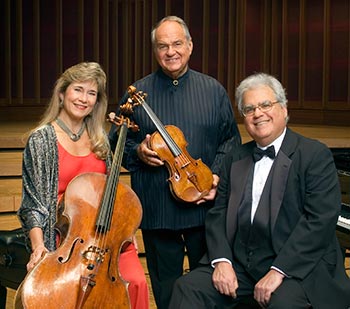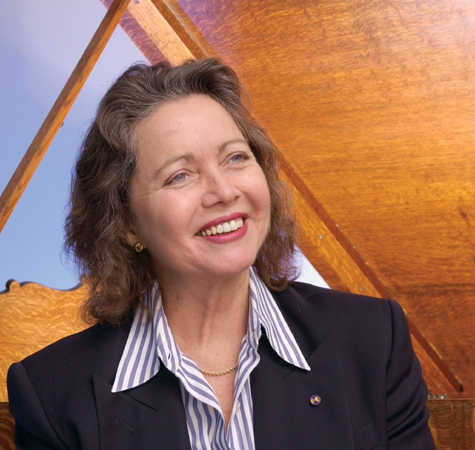Zwilich’s new Septet receives a brilliant Florida premiere
While quartets and trios abound in the chamber music literature, septets are extremely rare. Ellen Taaffe Zwilich created just such a work for the unusual instrumental combination of piano, three violins, two cellos and viola, which has its unveiling in New York last year.
The same two ensembles—the Kalichstein-Laredo-Robinson Trio and the Miami String Quartet— joined forces for the South Florida premiere of Zwilich’s score Sunday night at the Kravis Center in West Palm Beach. (Benny Kim substituted for the Miami Quartet’s indisposed first violinist, Ivan Chan.) The concert was presented by the Regional Arts concert series, one of twelve organizations and performance venues that commissioned the piece.
Zwilich, a native of Coral Gables and the first woman to win the Pulitzer Prize for music, has long exhibited a unique gift for crafting intricate chamber works. She has had a particularly close relationship with the KLR threesome, creating solo and concerted pieces for its members as well as an impressive piano trio.
The concept of the Septet for Piano Trio and String Quartet was initially suggested by cellist Sharon Robinson. In her brief introductory remarks, Zwilich indicated that she eagerly embraced the challenges of writing for such a unique instrumental component. The result is one of this composer’s most sophisticated works, uncompromising in its austere thematic invention and structural complexity.
Zwilich lyrical chromaticism laced with bracing dissonance shines through the opening movement. Initially a thematic fragment from the composer’s Piano Trio is answered by a melody from her String Quartet No.1. The piano’s entrances commences an incessant, driving rhythmic pattern propelled by acerbic Prokofiev-infused proclamations. Quasi una Passacaglia (second movement) suggests the spare neo-Baroque patina of Hindemith’s Four Temperaments with brusque intersections of greater power and severity. Zwilich’s passion for jazz takes full rein in Games, a panoramic overview of the genre from Scott Joplin to Charlie Parker. Powerful emotions permeate Au Revoir, the conclusion almost elegiac in scope and tone. Zwilich’s instrumental mastery and inventive melodic transformations have yielded a singular work that revels in its profusion of instrumental colors and is a rollercoaster of moody conversations, both joyous and intense.

No composer could have wished for more fervent advocacy than the combined ensembles elicited in a performance of surpassing brilliance. Pianist Joseph Kalichstein was a tower of strength in the initial astringencies and the lovely arpeggios of the passacaglia. In the third movement, he exhibited the freewheeling jazz facility of a Keith Jarrett. Violinist Jamie Laredo’s tensile energy fit the piece’s rhythmic propulsion to perfection. The Miami Quartet’s new violist Yu Jin exhibited mahogany tonal hues and showed virtuosic abandon in multiple solo opportunities. Sharon Robinson’s passionate intensity and darkly molten tone took pride of place.
That Zwilich’s work made such a powerful impression was all the more remarkable in the unfriendly acoustical environment of Kravis’ Dreyfoos Concert Hall. This venue’s arid sound can be less than ingratiating for orchestral performances.
The slender string tone produced from the stage was most detrimental to Boccherini’s String Quintet in E Major which might be defined as Mozart with an Italian accent. Kim was a less than decisive leader, the Andantino turning prosaic. Kim, a faculty member at the University of Missouri Conservatory of Music who has a flourishing solo career, seemed uncomfortable with the niceties of chamber performance. His intonation was sometimes imprecise, especially in the central minor key episode of the finale. Despite a spirited display by cellist Keith Robinsonn, much of the work’s Rococo charm was lost.
Dvorak’s nostalgic Quintet in A Major for Piano and Strings was an exhilarating conclusion to the evening. The Kalichstein-Laredo-Robinson players were joined by Kim and Yu in a cogent, strongly pointed projection of this score’s folk roots and rollicking melodies. Laredo’s sterling musicianship and strong leadership brought edgy thrust and bite as well as evocative yearning to this masterpiece. Kalichstein’s coolly objective, almost Mozartean approach prevented the performance from flaring into overwrought gestures. The Dumka was happily devoid of overt melodrama while the lively Scherzo received unusually rapid articulation, leavened by a broadly spacious central trio section. Wonderfully transparent contrapuntal lines enlivened the engaging finale right down to an exciting coda, capped in high style with incendiary exclamation by Kalichstein.
Posted in Performances
Leave a Comment
Mon Jan 18, 2010
at 1:27 pm
No Comments







